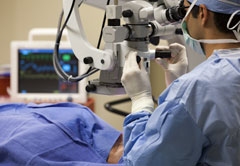Georgia Eye Institute Announces Promotion
Georgia Eye Institute Announces Promotion of Andreia Guthery

8 February 2016 – Savannah, GA – Georgia Eye Institute (GEI) announces the promotion of Andreia Guthery to Satellite Office Coordinator. Guthery Joined GEI 10 years ago, and has held positions in the front office, and billing department.
As Satellite Office Coordinator, Guthery will oversee daily operations in the Vidalia, Glennville, Statesboro, and Richmond Hill offices, ensuring that office policies, procedures and plans are executed in a smooth and expeditious manner, as well as performing financial oversight, office and insurance administration, and personnel management duties.
GEI provides leading edge corrective eye surgery, ophthalmic care, primary eye care and surgical eye care. For more than 20 years the pioneering surgeons and staff at GEI have set new standards for outpatient cataract surgery and lens implantation, advanced retinal care for diabetic eye disease, LASIK laser vision correction, glaucoma management, treatment for macular degeneration, corneal disease, oculoplastic surgery corrective eye surgery, and optometry.
GEI has 13 area offices, including locations in Bluffton, Brunswick, Glennville, Hardeeville, Hinesville, Jesup, Richmond Hill, Rincon, Savannah, Statesboro, and Vidalia. They also provide patients the comfort, safety, convenience and cost savings of a Medicare-approved AAAHC Accredited outpatient surgery center. Georgia Eye Institute Surgery Center (ASC) was built in 2010 to complete the comprehensive care that Georgia Eye Institute provides to our cataract, glaucoma, retinal and corrective eye surgery patients. For more information, visit gaeyeinstitute.com.
###
For more information, contact:
Frances Burruss
Joselove-Filson Advertising, Inc.
912.353.7732 x 22 | frances@joselovefilson.com
5 Things You Should Know About Laser Eye Surgery
5 Things You Should Know About Laser Eye Surgery
 Although laser eye surgery has been around since 1988, there is still a lot to learn about this new technology. Individuals who have vision problems often visit an ophthalmologist to find out what can be done about their vision. Doctors gravitate to the use of laser technology in these settings to get a clean line, making it easy for the patient to heal. However, there are many different facts you may not know about this innovative technology.
Although laser eye surgery has been around since 1988, there is still a lot to learn about this new technology. Individuals who have vision problems often visit an ophthalmologist to find out what can be done about their vision. Doctors gravitate to the use of laser technology in these settings to get a clean line, making it easy for the patient to heal. However, there are many different facts you may not know about this innovative technology.
LASIK and laser eye surgery can handle a variety of vision impairments, including myopia, hyperopia, and astigmatism. The technology is customizable to each individual, making it easy to modify with each condition. Individuals with astigmatism may require more attention and time, since the eye requires a three-dimensional image to accurately make the incision. Once healed, you will no longer need your contact lenses or glasses. This technique is responsible for over 90% of eye surgeries annually, adding up to over two million patients worldwide every year.
Each person who undergoes laser eye surgery receives the same high-quality service, but this technology allows the doctor to customize the treatment specifically to each patient. Based on your initial examination, your doctor determines if laser eye surgery is right for you and what type of surgery you should have. The specialist will choose between a bladeless approach and wavefront technology to correct your visual impairment. Choosing to have laser eye surgery may be costly now, but you save thousands of dollars on new glasses and boxes of contact lenses for the rest of your life.
 The procedure itself is relatively simple. Using laser technology, the ophthalmologist takes a three-dimensional image of the eye, discovering the exact size, and shape to prepare for the surgery. Since laser eye surgery makes no incisions with a blade, the procedure goes by relatively fast, making it easy to return to work only a few hours later. Laser eye surgery is essentially painless and does not even require full sedation or anesthesia. Some physicians offer prescriptions for anxiety prior to the exam to help calm the nerves; however, the surgery itself causes minimal discomfort. To eliminate any potential pain during the surgery, your doctor applies numbing eye drops prior to using the laser technology.
The procedure itself is relatively simple. Using laser technology, the ophthalmologist takes a three-dimensional image of the eye, discovering the exact size, and shape to prepare for the surgery. Since laser eye surgery makes no incisions with a blade, the procedure goes by relatively fast, making it easy to return to work only a few hours later. Laser eye surgery is essentially painless and does not even require full sedation or anesthesia. Some physicians offer prescriptions for anxiety prior to the exam to help calm the nerves; however, the surgery itself causes minimal discomfort. To eliminate any potential pain during the surgery, your doctor applies numbing eye drops prior to using the laser technology.
Aside from the speediness of the procedure, the best part about choosing laser eye surgery is the fast recovery time. Since these procedures do not involve the use of a scalpel or other blade, the incision is precise and clean. Though doctors may prescribe eye drops to combat dry eyes, many patients can resume their daily activities quickly. Some individuals even return to work and social engagements within the same day.
If you have additional questions about laser eye surgery, speak with an ophthalmologist. The expertise of a professional can help you decide if you want to correct your vision permanently with little healing time. A vision exam often shows if you are a candidate for corrective eye surgery, helping you to see clearer than through your glasses.
Laser Eye Surgery
What is Laser Eye Surgery?
Laser Eye Surgery is designed to correct the vision of an individual with myopia, hyperopia, and astigmatism. An ophthalmologist, reshaping the cornea of the patient for improved vision, always performs this procedure. Some patients fear the thin cutting in the flap of the cornea; however, the days of scalpels and cuts are over. By combining the technology of the Wavelight Allegretto Excimer Laser and the FS200 Femtosecond Laser, the ophthalmologist can achieve greater precision without having to touch the eye at all.
 The Wavelight Allegretto Excimer Laser and the FS200 Femtosecond Laser are used as the first laser system that requires no cutting into the eye. Before laser technology became, ophthalmologists would use a microkeratome to open up the cornea. However, the use of a laser gives your specialist the ability to customize the flap to your particular eye shape and ailment. Using Perfect Pulse technology, the Wavelight Allegretto Excimer Laser effectively and safely creates a thin flap in the cornea. Once open, the available ophthalmologist remodels the cornea in a way that perfects the patient’s vision. This approach varies from person to person, making laser technology the best chance at perfect vision.
The Wavelight Allegretto Excimer Laser and the FS200 Femtosecond Laser are used as the first laser system that requires no cutting into the eye. Before laser technology became, ophthalmologists would use a microkeratome to open up the cornea. However, the use of a laser gives your specialist the ability to customize the flap to your particular eye shape and ailment. Using Perfect Pulse technology, the Wavelight Allegretto Excimer Laser effectively and safely creates a thin flap in the cornea. Once open, the available ophthalmologist remodels the cornea in a way that perfects the patient’s vision. This approach varies from person to person, making laser technology the best chance at perfect vision.
Upon leaving the ophthalmologist’s office, patient typically receives eye drops or other antibiotics that they need to apply as instructed. The patient receives dark eyeglasses to allow the eyes time to adjust to the new vision without harmful light from the sun.Some Laser Eye Surgery patients decide to use protective goggles instead to reduce dryness and prevent themselves from irritating the surgical site. Follow your surgeon’s directions carefully to make sure your eyes heal properly.
The Laser Eye Surgery process is now safer than ever before, minimizing the margin for error consistently on this already safe procedure. Using lasers for eye surgery gives your ophthalmologist greater control and more predictability when making the changes to your vision. Additionally, surgeons who use lasers for their corrective eye surgeries have better consistency, which means more surgeries that are successful. Since the laser technology is more precise, individuals spend less time healing after the surgery and have a lowered risk of injury post-surgery. The success of this surgical advancement has been studied over the years, concluding that the overall quality of life is improved for patients who previously suffered from vision impairment.
Wavelight Press Release
Georgia Eye Institute First To Bring All-Laser
LASIK Technology To Benefit Savannah Area Patients
January 30, 2014 – AUGUSTA, GA…In an effort to enhance the safety, precision and comfort of LASIK – and help reduce patient fear and anxiety – LASIK specialist Elizabeth Miller, MD and the Georgia Eye Institute are introducing the first all-laser LASIK procedure in the Savannah region. The LASIK procedure will feature the combination of the Wavelight Allegretto Excimer Laser and FS 200 Femtosecond Laser, which is the first laser system designed specifically to perform LASIK.
“My colleagues and I are extremely proud to bring this all-laser LASIK technology to the Savannah region,” said Dr. Miller. “The Wavelight LASIK system is truly state-of-the-art and allows us to take an already safe and effective procedure and bring it to the next level,” she said.“The all-laser method of LASIK is becoming the gold standard of care worldwide and Georgia Eye Institute has always taken great pride in offering our patients leading edge ophthalmic care.”
The WavelightExcimer/ FS200 Femtosecond Laser is the first laser suite designed specifically to perform LASIK. The FS200 gives surgeons complete control for personalized treatment, precise, predictable procedures and the most consistent results. The Wavelight laser features Perfect Pulse laser technology and a high speed tracking system that makes it one of the safest, most precise and effective optical lasers currently available.
“Our advanced laser system is designed to treat a wider range of nearsightedness, farsightedness and astigmatism, which allows us to customize a treatment plan based on each patient’s specific needs,” Dr. Miller pointed out. “As refractive surgeons, we are always researching ways to improve refractive errors such as nearsightedness, farsightedness and astigmatism. Our new laser system allows us to do that with increased levels of safety, precision and accuracy.”
LASIK is a two-step process that includes making a thin protective flap on the surface of the cornea, which is gently lifted to allow the surgeon to treat the underlying corneal tissue. In the past, a mechanical instrument known as a microkeratome was used to create the protective flap. Although safe and effective, the microkeratome cannot provide the accuracy and precision attained by the FS200 Femtosecond laser. “We’re now able to create a custom flap to the specific needs of a patient in only a few seconds,” said Dr. Miller.“A flap created with the FS200 heals more securely than a flap created by the traditional microkeratome blade, resulting in a flap that is stronger and more resistant to injury.”
Dr. Miller is confident her new method of LASIK will help alleviate some of the patients’ fears and anxiety about having LASIK. She said LASIK patients are awake and comfortable during the entire procedure. The first step in the LASIK process takes less than 30 seconds to create the flap and the actual laser treatment takes only seconds as well.
To go along with the speed and accuracy of our new procedure, the Wavelight system is also equipped with one of the fastest multi-dimensional eye trackers in the world. “Our new eye-tracking technology is able to track eye movement at an amazing 1,050 times per second,” said Dr. Miller. “This is ten times faster than the human eye is capable of moving,” she said, adding, “this advanced tracking insures the most precise delivery of treatment and perfectly complements the speed of the laser.This allows us to ensure the laser spots are placed exactly where they need to be.”
The Wavelight suite is a major advancement in LASIK. The speed, accuracy and safety allows Georgia Eye Institute the ability to expand treatment capabilities, enhancement current treatments, broaden the range of correction and provide the ultimate in safety and outcomes to all patients in the greater Savannah and surrounding areas.
Georgia Eye Institute is one of the leading comprehensive ophthalmic centers in the south. They’ve been caring for the eyes of Savannah for more than two decades and offer patients convenient access at 13 are locations. Their main office is located at 4720 Waters Avenue, Savannah, GA. Their list of services include: LASIK laser vision correction, cataract removal and lens implantation, treatment for diabetic eye disease, glaucoma management, ocluloplastics, full-service optical and contact lens fitting. For more information, contact Kathy Hegan at 912-629-5964.
